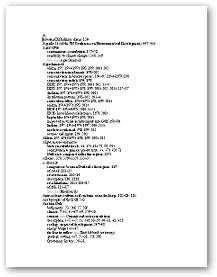





|

Why is an index important for your publications?
- Your readers can locate information quickly and efficiently.
- Readers continue to return to a well-indexed publication for information; they do not
return to publications when finding information is a tedious, frustrating process.
- A well-crafted index makes the content accessible, ensuring that all the work and
money invested in the publication is worthwhile.
- Libraries buy books with indexes over comparable books without indexes.
- An index groups together related information even if it is scattered in various
places throughout the text.
- An index shows relationships among concepts.
 What can I, as a professional indexer, do for you?
What can I, as a professional indexer, do for you?
- Produce integrated, logical, and reader-friendly indexes for a variety of publications:
trade non-fiction, reference books, textbooks, travel guides, professional journals, annual
reports, scholarly books
- Ensure indexes fit into the number of pages or lines that you specify
- Meet your deadlines so there are no press delays
- Embed indexes in works that change frequently (see below)
How long does indexing take?
- This depends on the complexity of the material to be indexed, the density of the
text, even the size of the pages.
- It can run from 4 or 5 pages an hour for dense, complex material to 15 or 18
pages an hour for material with many illustrations and less complex content.
How much does it cost?
- Rates are provided on request.
- Estimates are based on a sample of the text.
- Cost is directly related to the complexity and density of the material, plus its length.
What about embedded and XML indexes?
- These are useful, practical, and economical for publications that are revised frequently or if the publisher want to "single source" an index for different formats.
- They often take somewhat longer to create than regular back-of-the-book indexes as the complex formatting of entries slows down the indexer. However, indexing of subsequent editions is much faster as only the new or revised sections need indexing.
- Index "tags" are inserted in the publisher's InDesign files.
What about computer-generated "indexes"?
- These are really just concordances or lists of words, not indexes.
- They do not deal with relationships, concepts, and hierarchies.
- Computer-generated "indexes" split information among synonyms, e.g.,
First Nations, Aboriginal peoples, Indians, Natives. Information is not gathered in
one location so readers may easily miss many references.
- Problems result from numbers, symbols, titles, abbreviations, acronyms, misspellings.
- Concepts, people, and places are not always referred to directly; these
references are completely missed by computer passes.
- Page ranges are not available.
 © 2015 Buchanan Indexing & Editing
© 2015 Buchanan Indexing & Editing
For more information, contact
pbuchanan@index-edit.ca
|










 © 2015 Buchanan Indexing & Editing
© 2015 Buchanan Indexing & Editing